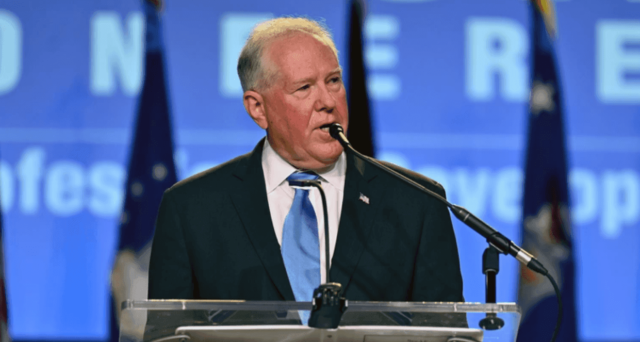
Air Force, Space Force leaders: US can’t afford to lose in space Secretary of the Air Force Frank Kendall during the Air Force Association Air, Space and Cyber Conference in National Harbor, Md., Sept. 20, 2021. (U.S. Air Force photo by Wayne Clark)
Two top military leaders warned Tuesday that the U.S. can’t afford to lose its dominant position in space since the rest of the nation’s military relies on space capabilities ranging from missile detection and tracking to navigation and communications.
Air Force Secretary Frank Kendall and Gen. John “Jay” Raymond, top commander of the 2-year-old U.S. Space Force, both reinforced the importance of maintaining the nation’s key space capabilities during back-to-back speeches leading off the Space Symposium at The Broadmoor. Both called losing in space “unacceptable” and emphasized the importance of modernizing U.S. space systems to make sure they can’t be compromised.
“Change is hard, but losing in space is unacceptable. Space has changed and is now a warfighting domain. I ask you to accept that change is with us,” Raymond told the audience, ranging from key military brass and aerospace industry officials to allied civilian and military leaders. Those changes, he said, include reducing the time needed for and the cost of deploying new space systems.
Previous systems were built for technical performance in a time when the U.S. faced little competition in space and enjoyed “a substantial lead in our science and technology,” Raymond said. Growing competition from military adversaries requires a shift to satellites that are less vulnerable to attack and can be launched into space more quickly, which Raymond called the centerpiece of U.S. defense strategy.
Space is key to both national defense and a growing commercial space industry, but space must remain “accessible, stable and secure,” which is no longer a given, Raymond said. The U.S. faces competition in space from nations that “don’t share our view” of keeping space open to all nations, and U.S. military personnel in every branch will sometime soon face “space-enabled adversaries.”
Both Kendall and Raymond emphasized that the Biden administration’s new defense budget proposal, which increases Space Force spending by 40%, is a key to maintaining U.S. dominance in space. A key part of that proposal is spending $1 billion to ensure the nation’s missile warning and tracking systems are more resilient to address recent weapons tested last year by China and Russia, in large part by creating more targets for adversaries to target.
Kendall said during a briefing that modernizing communications systems also is on a fast track, but the Pentagon is sorting out how to update intelligence and reconnaissance systems. He said the Pentagon is “moving as quickly as we can,” and modernization of intelligence and reconnaissance systems likely will be addressed in the administration’s 2024 budget plan. Raymond said part of the delay is working with intelligence officials to “get the requirements right.”
The budget boost isn’t “evidence of bureaucratic success” but instead a “recognition of the Space Force and the capabilities it provides,” Kendall said. The extra funding is needed to combat the nation’s biggest strategic challenge — “China, China, China” — and the growing threat it and other adversaries pose to “America’s ability to project power to deter aggression,” which requires space-based systems.
China’s expansion of its nuclear arsenal will soon give it capabilities similar to the U.S. and Russia, Kendall said, creating a three-way rivalry of top nuclear powers for the first time since such weapons were developed at the end of World War II.
While China remains America’s primary rival in space, Kendall noted the threat posed by Russia’s test of anti-satellite capabilities that “defied acceptable norms of behavior in space,” creating a large cloud of debris in space. He also said Russia has thousands of nuclear weapons and recently “demonstrated its lack of respect for the accepts restraints on aggression” with its invasion of Ukraine.
Kendall said the invasion was a “wake-up call” to those who believed a conflict between the U.S. and Russia was impossible and people worldwide will “have to get used to being in that world again,” comparing the diplomatic and economic moves after the invasion to the Cold War that followed World War II. He said he expected there is “going to be a lot of lessons learned by all parties involved.”
To counter those threats, the Space Force and its parent service, the Air Force, are “focused on modernization to build capabilities in space as fast as possible.” Space is “essential to our modern way of life,” he said, and it is “important to keep the nation safe from threats (posed) by Russia and China,” which requires the U.S. to retain operational space superiority, despite growing challenges.
Kendall called space “the great enabler” for joint operations among all branches of the military.
___
(c) 2022 The Gazette Distributed by Tribune Content Agency, LLC




